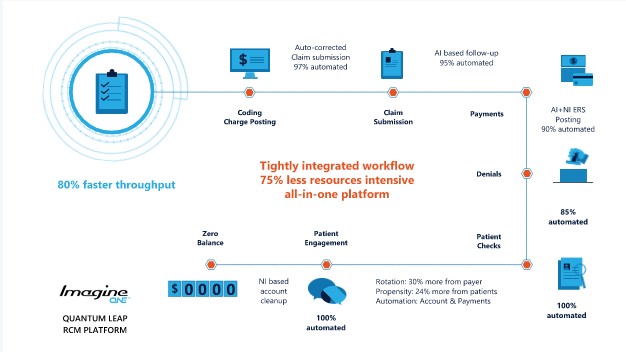Time is a valuable commodity. Making the most of your time is important, especially when labor shortages are leading to ever-growing to-do lists and the wearing of many hats.
Physician practices and healthcare organizations know this all too well, being responsible not only for patient care, but also numerous administrative duties, from insurance verification to billing and more.
On Demand Webinar: Help Wanted! Staffing Shortages and How AI is Changing the Future of Your Team
Maybe you’ve heard about an all-in-one platform. Instead of traditional point-technology solutions, an integrated platform boasts claims processing, denial management, patient payment and other functionality in a single solution. That means having just one vendor for all revenue cycle management (RCM) needs, from pre-service to zero balance.
To get all these new features in just one platform, though, you may have to rip out an older system and start fresh. And yes, that takes time.
However, if you’re like some physician practices, you probably have already spent countless hours of your time (not to mention quite a lot of your money) organizing and maintaining contracts and pricing models for various disconnected solutions. You get to speak with various representatives from each vendor on a regular basis for support, more if you have any workflow issues. What would you do with your “extra” time if you didn’t have to make all those calls? Interoperability doesn’t have to be a pipe dream.
An integrated system helps reduce the cost and complexity associated with deploying multiple standalone solutions AND increases productivity and transparency for an improved customer experience. Surely that is something worth considering.
With a single RCM platform, you get more accurate and consistent record-keeping along with customizable, real-time reporting. All applications are under the same umbrella, giving you a unified focus. This combination makes data easier to analyze and understand, but does that really make your decision-making any easier? Do you benefit from a more reliable data architecture that integrates correctly and seamlessly across functions? Here at Imagine, we think the answer is YES.
If you can’t come up with enough excuses to justify keeping your existing single-point solutions, the following is a list of advantages centralized RCM platforms provide that probably matter for your practice:
- Streamlined operations from pre- or point-of-service to zero-balance – for patients and associated providers
- Improved communication between providers and patients
- Faster processing of insurance payments
- Increased accuracy
- Maximized efficiency through automated medical billing and payment processing
- More consistent services between departments and providers
- Enhanced regulatory compliance
- Fewer potential discrepancies, resulting in increased patient trust and satisfaction
- Availability of trending information to assess opportunities for continuous improvement
- A single line of support to ensure consistency
If you decide that you would like more of that valuable commodity — time — in your workday, consider a centralized revenue cycle management platform. At ImagineSoftware, we can help you decrease the cost of end-to-end revenue cycle operations by up to 75% while freeing up resources for patient care.
Our all-in-one RCM platform, ImagineOne™, takes autonomous billing to the next level with speed and enhanced usability. It leverages artificial intelligence (AI) and robotic process automation (RPA) within an enhanced core automation engine to optimize processes and remove the need for bolt-on programs, outsourced services, and in-house labor dependencies.

Request a demo to learn more!